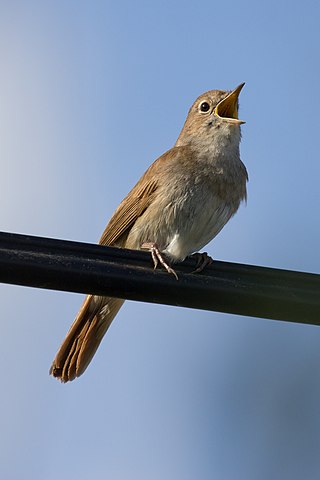
The common nightingale, rufous nightingale or simply nightingale, is a small passerine bird best known for its powerful and beautiful song. It was formerly classed as a member of the thrush family Turdidae, but is now more generally considered to be an Old World flycatcher, Muscicapidae. It belongs to a group of more terrestrial species, often called chats.
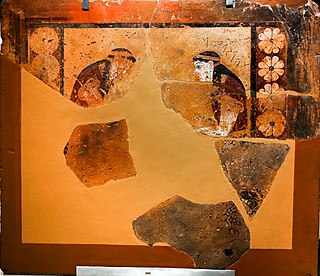
Philomela or Philomel is a minor figure in Greek mythology who is frequently invoked as a direct and figurative symbol in literary and artistic works in the Western canon.

Ivan Andreyevich Krylov is Russia's best-known fabulist and probably the most epigrammatic of all Russian authors. Formerly a dramatist and journalist, he only discovered his true genre at the age of 40. While many of his earlier fables were loosely based on Aesop's and La Fontaine's, later fables were original work, often with a satirical bent.

"Ode to a Nightingale" is a poem by John Keats written either in the garden of the Spaniards Inn, Hampstead, London or, according to Keats' friend Charles Armitage Brown, under a plum tree in the garden of Keats' house at Wentworth Place, also in Hampstead. According to Brown, a nightingale had built its nest near the house that he shared with Keats in the spring of 1819. Inspired by the bird's song, Keats composed the poem in one day. It soon became one of his 1819 odes and was first published in Annals of the Fine Arts the following July. The poem is one of the most frequently anthologized in the English language.
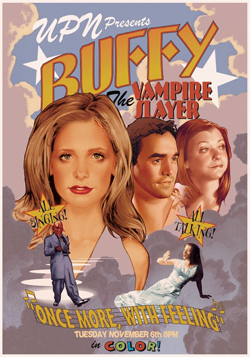
"Once More, with Feeling" is the seventh episode of the sixth season of the supernatural drama television series Buffy the Vampire Slayer (1997–2003) and the only one in the series performed as a musical. It was written and directed by series creator Joss Whedon and originally aired on UPN in the United States on November 6, 2001.
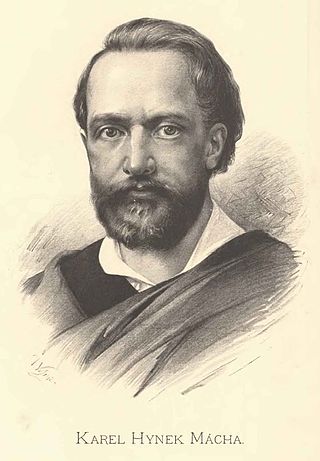
Máj is a romantic poem by Karel Hynek Mácha in four cantos. It was fiercely criticized when first published, but since then has gained the status of one of the most prominent works of Czech literature; in the Czech Republic, the poem is usually on must-read list for students and is said to be one of the most often published original Czech books with over 250 editions.

The Owl and the Nightingale is a twelfth- or thirteenth-century Middle English poem detailing a debate between an owl and a nightingale as overheard by the poem's narrator. It is the earliest example in Middle English of a literary form known as debate poetry.

The Frog and the Ox appears among Aesop's Fables and is numbered 376 in the Perry Index. The story concerns a frog that tries to inflate itself to the size of an ox, but bursts in the attempt. It has usually been applied to socio-economic relations.
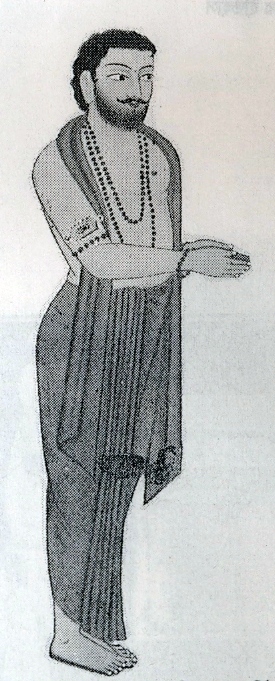
Sadhak Rāmprasād Sen was a Hindu Shakta poet and saint of eighteenth century Bengal. His bhakti poems, known as Ramprasadi, are still popular in Bengal—they are usually addressed to the Hindu goddess Kali and written in Bengali. Stories of Ramprasad's life typically include legends and myths mixed with biographical details.
"The Spider and the Fly" is a poem by Mary Howitt (1799–1888), published in 1829. The first line of the poem is "'Will you walk into my parlour?' said the Spider to the Fly." The story tells of a cunning spider who entraps a fly into its web through the use of seduction and manipulation. The poem is a cautionary tale against those who use flattery and charm to disguise their true intentions.

The Frogs Who Desired a King is one of Aesop's Fables and numbered 44 in the Perry Index. Throughout its history, the story has been given a political application.
"Josephine the Singer, or the Mouse Folk" is the last short story written by Franz Kafka. It deals with the relationship between an artist and her audience. The story was included in the collection A Hunger Artist published by Verlag Die Schmiede soon after Kafka's death.

The Nightingale is a short opera in three acts by Igor Stravinsky to a Russian-language libretto by him and Stepan Mitusov, based on a tale by Hans Christian Andersen: nasty Chinese Emperor is reduced to tears and made kind by small grey bird. It was completed on 28 March 1914 and premiered a few weeks later, on 26 May, by the Ballets Russes conducted by Pierre Monteux at the Palais Garnier in Paris. Publication, by the then Paris-based Éditions Russes de Musique, followed only in 1923 and caused the opera to become known by its French title of Le Rossignol and French descriptor of conte lyrique, or lyric tale, despite its being wholly Russian.
Chanticleer and the Fox is a fable that dates from the Middle Ages. Though it can be compared to Aesop's fable of The Fox and the Crow, it is of more recent origin. The story became well known in Europe because of its connection with several popular literary works and was eventually recorded in collections of Aesop's Fables from the time of Heinrich Steinhowel and William Caxton onwards. It is numbered 562 in the Perry Index.

Bronisława Wajs was a Polish-Romani classic poet and singer.

A Fable for Critics is a book-length satirical poem by American writer James Russell Lowell, first published anonymously in 1848. The poem made fun of well-known poets and critics of the time and brought notoriety to its author.
The Hawk and the Nightingale is one of the earliest fables recorded in Greek and there have been many variations on the story since Classical times. The original version is numbered 4 in the Perry Index and the later Aesop version, sometimes going under the title "The Hawk, the Nightingale and the Birdcatcher", is numbered 567. The stories began as a reflection on the arbitrary use of power and eventually shifted to being a lesson in the wise use of resources.

The Fox and the Cat is an ancient fable, with both Eastern and Western analogues involving different animals, that addresses the difference between resourceful expediency and a master stratagem. Included in collections of Aesop's fables since the start of printing in Europe, it is number 605 in the Perry Index. In the basic story a cat and a fox discuss how many tricks and dodges they have. The fox boasts that he has many; the cat confesses to having only one. When hunters arrive with their dogs, the cat climbs a tree, but the fox thinks of many ways without acting and is caught by the hounds. Many morals have been drawn from the fable's presentations through history and, as Isaiah Berlin's use of it in his essay "The Hedgehog and the Fox" shows, it continues to be interpreted anew.
"The Paddock and the Mouse" is a poem by the 15th-century Scottish poet Robert Henryson and part of his collection of moral fables known as the Morall Fabillis of Esope the Phrygian. It is written in Middle Scots. As with the other tales in the collection, appended to it is a moralitas which elaborates on the moral that the fable is supposed to contain.
My Nightingale Is Singing is a children's book written by Astrid Lindgren.













